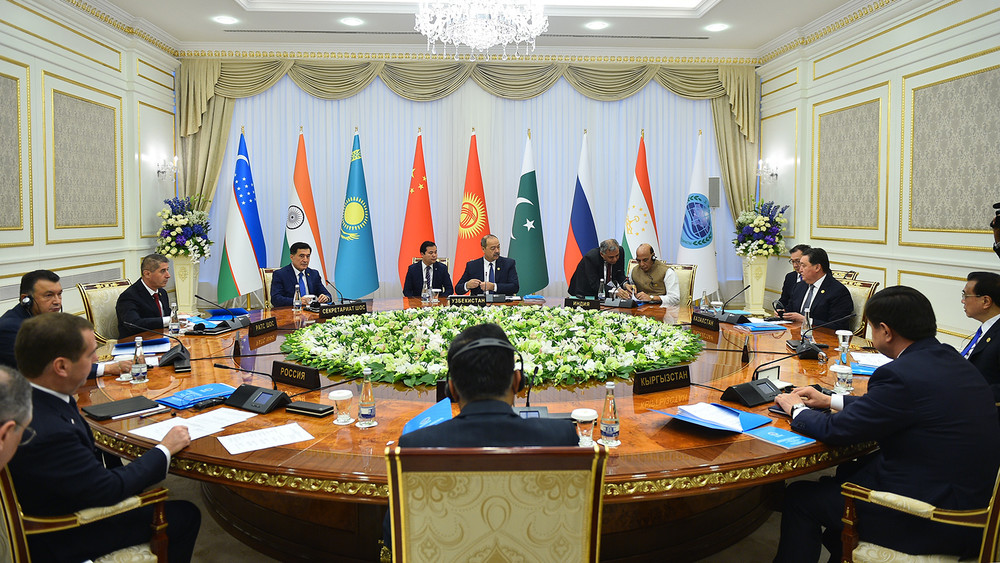
The journal “International Life” published an article by the head of the Department for Cooperation with Regional Organizations of the Ministry of Foreign Affairs of Uzbekistan, the national coordinator of the republic for SCO affairs Rakhmatulla Nurimbetov.
It is noted that June 15, 2021 marks the 20th anniversary of the establishment of the Shanghai Cooperation Organization, which in a relatively short period has managed to turn into one of the most influential multilateral structures in Eurasia.
The SCO was formed under the influence of fundamental changes in international relations at the end of the twentieth century. The creation of the Organization was a direct result of efforts to ensure stability and security in Central Asia. Four of the five young republics of the former USSR-Kazakhstan, Kyrgyzstan, Tajikistan and Uzbekistan-have become members of a multilateral structure that includes major powers such as Russia and China.
Over the past period, the SCO has managed to transform itself into a full-fledged regional organization, establishing practical cooperation in the field of security, in particular, in the fight against terrorism, extremism, separatism and drug trafficking.
At the same time, it is by no means a “military-political” structure. The founding states did not initially plan to create the SCO as a collective security organization or a military-political union in its classical sense. Rather, it represents a new type of regional organization – a new type of universal agenda, as described by former SCO Secretary-General Rashid Alimov.
The concept of the” Shanghai spirit “includes the following principles:” mutual trust, mutual benefit, equality, mutual consultation, respect for cultural diversity, the pursuit of common development”.
The principle of making all decisions within the SCO on the basis of consensus also serves to implement the “Shanghai spirit”. This allows the “medium” and “small” members of the Organization, along with China and Russia, to actively participate in determining the priorities of the SCO’s activities.
The key event in the life of the Organization in recent years has undoubtedly been its expansion in 2017 at the expense of two major Asian Countries-India and Pakistan. It is clear that these states are not only “new members”, but also competing” geopolitical players ” with political weight.
To the unresolved bilateral disputes on a wide range of issues between Delhi and Islamabad, the tension in Sino-Indian relations, which has been observed since the beginning of 2020, after border clashes, has recently been added.
Moreover, the fundamental changes taking place in the world, including under the influence of the pandemic crisis, pose new challenges and tasks for the SCO.
If the SCO wants to become an influential force in Eurasia, to take part in the formation of a new world order, it should update its agenda, adapt its institutions to changing realities.
Uzbekistan, as one of the SCO’s founding states, is interested in fully unlocking its potential by building up practical cooperation in those promising areas that meet the vital interests of all participating countries.
Changes in Uzbekistan’s foreign policy are also reflected in its multilateral diplomacy. In recent years, Tashkent has significantly increased its participation in international and regional structures.
This trend also applies to the SCO. The development of relations with the Shanghai Cooperation Organization will remain an important area of Uzbekistan’s foreign policy.
If we analyze the activities of Tashkent in recent years within the Organization, we can identify the following new accents.
In recent years, Uzbekistan has initiated the launch of new cooperation platforms within the SCO, including the SCO People’s Diplomacy Center in Tashkent, the mechanism for Meeting heads of railway administrations, the Silk Road International Tourism Institute in Samarkand, and others.
In total, over the past four years, the Uzbek side has put forward more than 30 initiatives. Uzbekistan stands for constructive and fruitful cooperation within the SCO, and is ready to support the initiatives of other parties that meet the interests of” joint development”, as stipulated in the SCO Charter.
It is important to fill the activities of the Shanghai Eight with new content, expand its agenda through such promising areas as the creation of interregional transport and transit corridors, innovative and digital development, the search for new points of economic growth, and the consolidation of the efforts of the member states in the fight against climate and environmental threats.
Uzbekistan is interested and ready to make its constructive contribution to the formation of the new SCO agenda in order to increase its practical relevance and international prestige.

Location: 103 Kurortniy Prospekt, Sochi, Russia. The Radisson Lazurnaya Hotel
There must be time
Here are the terms of participation
Comments
0